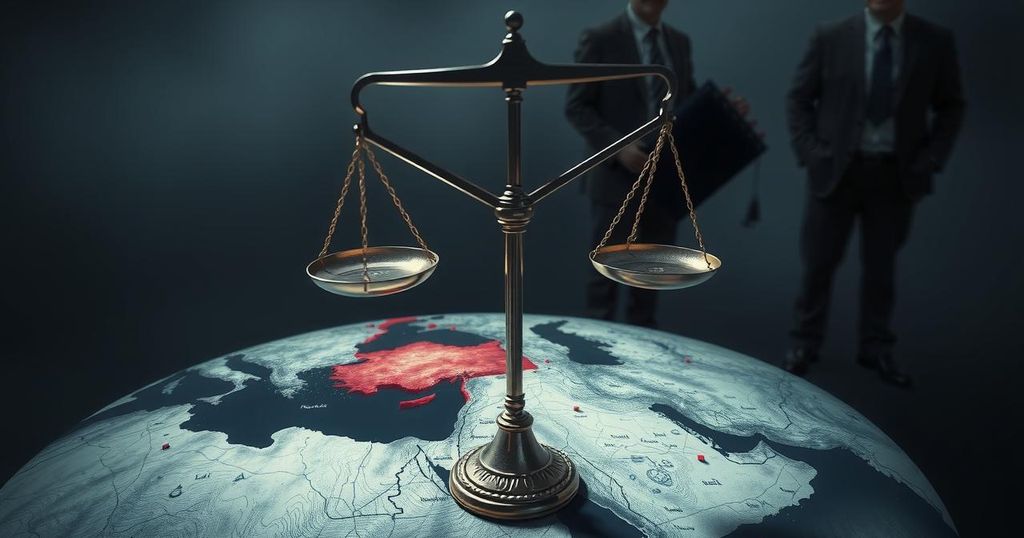Donald Trump’s proposal for U.S. control over Gaza and the displacement of Palestinians has triggered alarm in Jordan and Egypt, whose leaders fear permanent resettlement and the destabilization of their countries. As King Abdullah II and President Sisi prepare to meet with Trump, they must navigate past traumas, domestic unrest, and geopolitical complexities to advocate for their national interests in the face of U.S. pressure.
The recent proposal from former President Donald Trump advocating that the United States assume “ownership” of Gaza has incited significant international backlash. The plan suggests the relocation of over two million Palestinians, converting the area from a conflict zone into a thriving tourist destination. However, leaders from Jordan and Egypt have vehemently opposed this proposal, fearing permanent displacement of Palestinians to their countries. They are set to meet with Trump in Washington to advocate for a modification of this controversial approach.
Concerns are paramount in both Jordan and Egypt that such a policy could precipitate actual population transfer from Gaza and the West Bank. Jordan’s King Abdullah II and Egyptian President Abdel Fatah al-Sisi have expressed their fears about the possibility of Israel implementing a strategy to displace Palestinians. Geopolitical expert Neil Quilliam from Chatham House highlights their apprehension regarding Trump’s tendency towards transactional diplomacy, given their nations’ overwhelming dependency on US aid.
Historically, Jordan has absorbed significant numbers of Palestinian refugees following conflicts in 1948 and 1967, leading to an estimate that over half of its current population is of Palestinian descent. The memories of these displacements are still vivid within the Arab community. Analyst Katrina Sammour emphasizes that a new wave of displacement would inflict severe trauma upon already affected individuals, echoing the Nakba of 1948.
The demographic implications of Palestinian resettlement in Jordan are particularly sensitive. In the past, Jordan experienced internal conflict when the Palestinian Liberation Organization attempted to exert control over the kingdom. While such a scenario is unlikely to repeat itself, historical memory remains pivotal in Jordanian politics. Officials have been vocal against any Israeli attempts to displace West Bank Palestinians across the Jordanian border, which would be perceived as a severe provocation.
Jordanian leaders have expressed their concern that escalating violence in Gaza could unveil the broader intentions behind Israel’s expansionist policies in the West Bank. Displacing Palestinians from there would cross a significant boundary, provoking a fierce response from Jordan, which is considered a militarily capable nation within the region. Quilliam comments on these fears regarding potential annexation, which is viewed as an act of war.
Jordan’s government faces domestic unrest as public sentiments increasingly favor stronger advocacy for the Palestinian cause. Adapting to Trump’s demands risks alienating the population and seeming disloyal to Palestinian interests. However, Jordan’s historical peace treaty with Israel and reliance on US financial support present a precarious balancing act for the monarchy.
The complex identity questions regarding Jordanian nationality further complicate the matter, according to Alia Brahimi from the Atlantic Council. The potential ramifications of Trump’s overtures towards Jordan and its relationship with Israel could destabilize the monarchy. Additionally, the Jordanian economy is struggling to withstand the pressures of further mass immigration from Gaza.
In Egypt, security concerns dominate, particularly regarding the Sinai Peninsula. Authorities have consistently denied entry to Palestinians fleeing conflict during the recent war, worried that they could become a permanent demographic change. Brahimi cautions that any influx of refugees could harbor militant factions and challenge Egyptian stability, threatening the existing peace treaty with Israel.
Egypt faces severe economic hardships, meaning the prospect of becoming a refuge for displaced Palestinians carries significant economic implications. Upper-level Egyptian officials worry about aggravating public dissent and the potential for political upheaval amidst current unrest. The leadership in both Egypt and Jordan are acutely aware that compliance with what they perceive as systematic ethnic cleansing could severely damage their legitimacy.
Trump remains steadfast, suggesting in his statements that he believes there will ultimately be an acceptance of his proposals by leaders like Abdullah and Sisi, framing them as offerings of harmony and peace in the region. His comments have raised alarms among Jordanian and Egyptian leaders, who view his ideas as perpetuating the very nightmares they dread, threatening their national security and domestic stability.
The article discusses the implications of Donald Trump’s controversial proposal for the U.S. to take control of Gaza and displace over two million Palestinians. This plan raises significant concerns in Jordan and Egypt, where leaders fear the permanent resettlement of Palestinians could destabilize their countries both politically and economically. Historical context, current geopolitical relations, and the domestic consequences of such a policy are examined, highlighting the precarious balance these nations must maintain amidst U.S. pressure and regional instability.
In conclusion, Trump’s Gaza plan places Jordan and Egypt in a difficult position, facing potential political instability and socio-economic strain from increased Palestinian displacement. The historical context of past displacements and the delicate balance of current geopolitical relations necessitate careful navigation from both countries’ leaders. The fear of repeating traumatic events and concerns over national security underscore the complexities inherent in the proposed policy, putting the stability of the region at risk.
Original Source: www.theguardian.com






